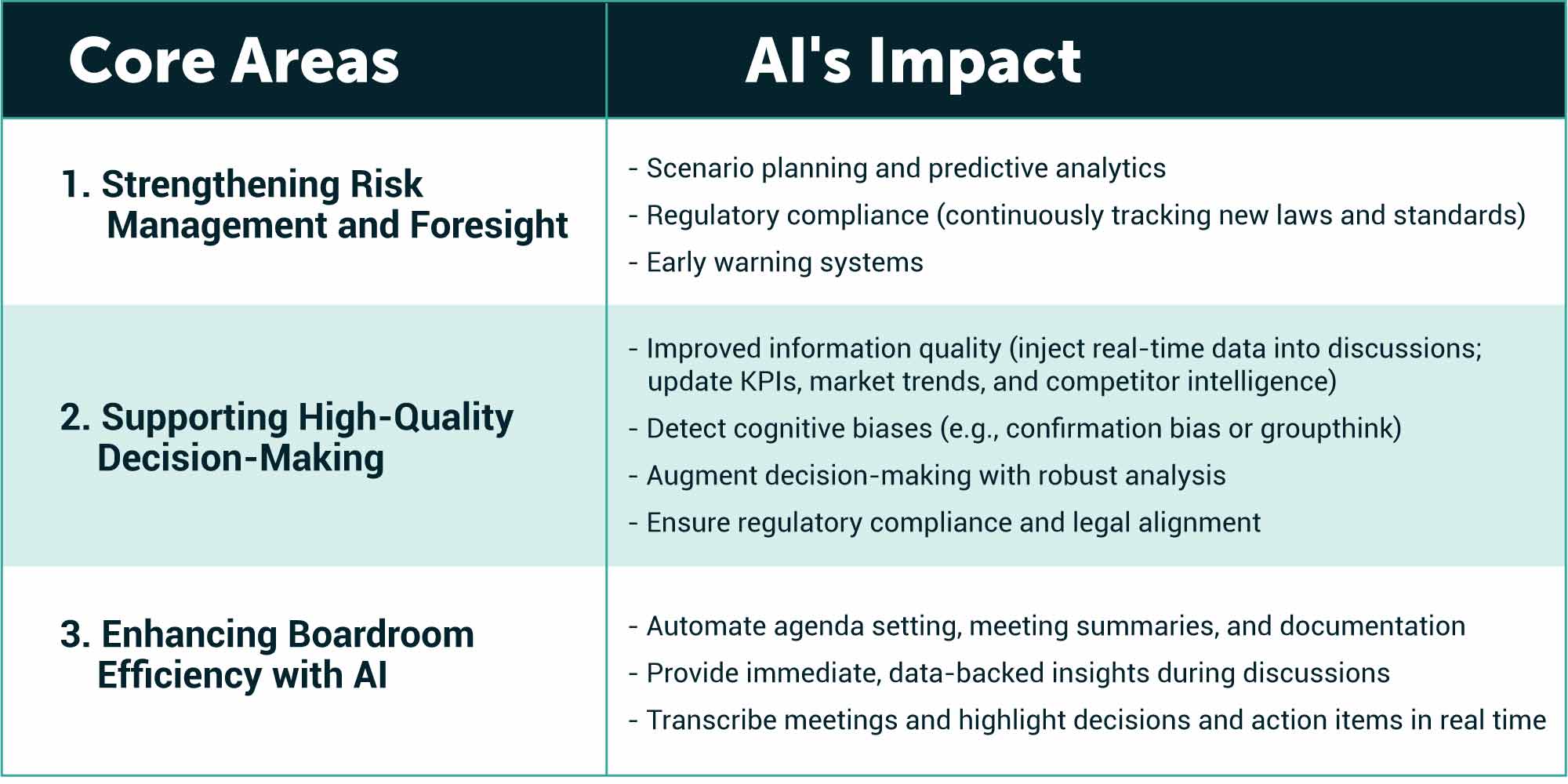
AI bubble or real shift? How leaders can prepare for what's next
Finance and digital strategy experts debate whether AI returns will materialize quickly enough to prevent a market correction. ...

by Didier Cossin, Yukie Saito Published October 13, 2025 in Artificial Intelligence • 7 min read
Artificial intelligence (AI) is profoundly transforming the business landscape, presenting both significant opportunities and new challenges to boards.
Projected to add $19.9tn to the global economy by 2030 and account for 3.5% of global GDP that year executives increasingly recognize AI’s transformative potential. Three-quarters (79%) of business leaders expect generative AI to drive substantial organizational change within three years. However, their boards remain hesitant and ill-equipped to engage with AI effectively. According to Deloitte’s State of Generative AI report, nearly half (45%) of board directors said AI has not yet made it onto their board’s agenda, and over three-quarters (79%) have limited or no knowledge of AI technologies.
This intent-action gap between AI’s potential and boardroom practice signals a critical need for boards to elevate their understanding of AI. In this article, we help show how boards can harness AI to strengthen risk management and foresight, support high-quality decision-making, and enhance boardroom efficiency.

Capable of processing immense amounts of data to detect emerging risks with far greater speed and accuracy than traditional methods alone, AI is a powerful ally for boards contending with an increasingly complex and fast-evolving risk landscape.
Generative AI tools are particularly effective in scenario planning, predictive analytics, and helping boards understand complex, multi-variable risks. In the insurance and banking sectors, for example, boards are using AI simulations to stress-test their portfolios against hypothetical scenarios. Rather than relying on annual slide presentations, directors can ask AI systems to create scenarios on demand and receive immediate results. This ability to quickly explore multiple future scenarios offers better foresight, and boards are increasingly exploring generative AI to simulate potential governance challenges and anticipate outcomes with unprecedented clarity.
From financial reporting to data privacy and, now, AI ethics regulations, regulatory compliance is a growing burden for boards. AI-powered compliance tools can continuously track new laws and standards, such as the EU’s AI Act or updated rules by the US Securities and Exchange Commission, and evaluate the company’s adherence. They can comb through company data to ensure policies are followed and flag any violations or control breakdowns for the board’s attention. Real-time analysis of risk indicators and compliance data means the board is no longer blind between quarterly reports, receiving up-to-date risk intelligence via dashboards.
Boards that integrate AI tools into their risk oversight processes gain an early warning system. AI-driven risk dashboards can alert the board to potential cybersecurity breaches, significant shifts in regulatory requirements, or brewing geopolitical instabilities before they escalate into crises. For example, machine learning models can continuously scan cybersecurity logs, financial transactions, supply chain data, and even news feeds to identify anomalies or early indicators of trouble. Patterns that might take human analysts weeks to discern can be flagged by AI systems almost immediately.
Progressive boards are establishing AI as a discussion topic, backed by clear governance frameworks, such as forming AI-specific board committees or expanding existing risk and technology committee mandates to oversee AI-related risks and opportunities. JPMorgan offers a perfect example of this as its board has AI oversight integrated into both risk and innovation committees, ensuring AI-driven opportunities and risks receive equal strategic attention, not merely as a sub-point under digital transformation.
By embedding AI in risk management, boards can elevate oversight from periodic reviews to continuous, data-driven vigilance. Directors should ensure their organizations have an AI-enabled risk framework that integrates AI into the risk management system.

“Boards today face increasingly complex decision-making, involving large data sets and fast-changing market dynamics.”
Boards today face increasingly complex decision-making, involving large data sets and fast-changing market dynamics. AI can significantly enhance the quality of board decisions by providing deeper insights, unbiased analysis, and decision support tools that go beyond human cognitive limitations.
One immediate benefit is improved information quality. Instead of relying purely on management summaries or board packets that are often prepared with a time lag, directors can leverage AI to bring real-time data into discussions. As an example, AI-driven analytics platforms can update KPIs, market trends, or competitor news live during board meetings, ensuring decisions are grounded in the latest information.
Another domain of decision support is regulatory compliance and legal considerations. Boards must make decisions that uphold fiduciary duties and comply with a wide array of regulations. AI-enabled compliance tools help directors navigate complex governance and disclosure requirements efficiently. These systems continuously monitor evolving regulatory landscapes and can alert the board if a contemplated strategic move might trigger compliance issues.
It is important to approach AI, understanding that it does not replace human judgment; rather, it enhances it with robust analysis. AI can challenge assumptions, generate creative alternatives, and help broaden the scope of discussion; however, its impact is most beneficial when board members are actively engaged with it, using it as a thinking partner rather than deferring to it passively.
In a similar context, you can use AI to detect cognitive biases in board discussions. As humans, we are susceptible to confirmation bias, groupthink, or anchoring on certain figures. AI tools, by contrast, analyze data objectively and can call attention to facts that human decision-makers might overlook or unconsciously downplay. You can begin to leverage AI by using it as a “devil’s advocate” in decision-making, assigning it to surface counterarguments, or detecting signs of groupthink.
Of course, the use of AI in decision-making raises its own ethical questions. Many boards struggle with AI’s ethical and reputational risks, from bias and misinformation to intellectual property concerns. Boards are increasingly pushing for AI governance frameworks that ensure transparency, accountability, and compliance. When thoughtfully integrated, AI can elevate board decision-making to new heights of quality and integrity. Although the board remains the ultimate decision-maker, directors apply their judgment to AI insights. With AI, decisions become more evidence-based, alternatives are more fully explored, and ethical considerations are weighed more effectively.

AI is redefining boardroom efficiency by automating key tasks and delivering real-time intelligence. A significant operational breakthrough lies in AI’s ability to facilitate agenda setting, meeting summaries, and documentation. Traditionally, preparing for these tasks has been time-consuming. Now, AI can help generate agendas based on past meeting patterns and current priorities; summarize complex board materials into briefings; and draft meeting minutes in real time.
AI enhances the quality and accuracy of boardroom discussions through real-time transcription and insight extraction. Natural language processing (NLP) algorithms can transcribe meetings and highlight action items and decisions instantly. Leading meeting platforms offer automated minute-taking, with key points, assigned tasks, and approvals. This not only saves time but also produces more accurate records. Advanced systems also enable “smart” document reviews, often powered by large language models (LLMs), where AI scans board materials for compliance red flags or inconsistent language, detecting potential issues such as risky phrasing before records are finalized as part of the official corporate record.
AI empowers directors to make informed decisions, eliminating delays caused by traditional analysis cycles. An AI assistant can retrieve relevant financial or competitive data instantly in response to live queries, reducing reliance on post-meeting reviews.
AI is collectively transforming the board’s workflow, elevating governance through speed, clarity, and continuous insight. Forward-thinking boards can first adopt AI to set agendas, minute meetings, summarize complex materials into briefings, and manage follow-ups to remove logistical friction and save on time-consuming tasks.
AI is reshaping the business landscape.
AI is reshaping the business landscape. It can enhance risk assessment, support better decision-making, and improve boardroom efficiency, but it must be deployed responsibly and ethically.
Board members have a critical role to play in harnessing AI with strategic intent and disciplined oversight. The most effective board members embrace AI as an enabler, while maintaining the rigor of independent, human judgment. Boards are increasingly establishing AI usage guidelines for directors and offering targeted training to build AI fluency and accountability.
Ultimately, the board’s fiduciary duty extends to ensuring that AI contributes to the creation of long-term value for all stakeholders. This requires active oversight to ensure that AI initiatives align with the company’s core strategy and risk appetite, rather than being driven by short-term gains or transient technological trends.

Founder and director of the IMD Global Board Center, the originator of the Four Pillars of Board Effectiveness methodology and an advocate of Stewardship.
Didier Cossin is the Founder and Director of the IMD Global Board Center, the originator of the Four Pillars of Board Effectiveness methodology, and an advocate of stewardship. He is the author and co-author of books such as Inspiring Stewardship, as well as book chapters and articles in the fields of governance, investments, risks, and stewardship, several of which have obtained citations of excellence or other awards. He is the Director of the High Performance Boards program, the Mastering Board Governance course, The Role of the Chair program, and co-Director of the Stakeholder Management for Boards program.

Senior Research Writer
Yukie Saito is a Senior Research Writer at the Global Board Center at IMD. Her research interests primarily focus on corporate governance, stewardship, and responsible investment, with her publications centered around these topics. Her work also includes examining governance issues, effective board practices, and the impact of governance on social and environmental performance. She holds a D.Phil. from the University of Oxford, a Master of Public Affairs (MPA) from Sciences Po, Paris and a B.A. in Business and Commerce from Keio University. She is an associate researcher at the Fondation France-Japon de l’École des Hautes Études en Sciences Sociales (EHESS).

22 hours ago • by Karl Schmedders, José Parra Moyano in Artificial Intelligence
Finance and digital strategy experts debate whether AI returns will materialize quickly enough to prevent a market correction. ...

February 10, 2026 • by Tomoko Yokoi in Artificial Intelligence
Tomoko Yokoi explains why GenAI isn’t delivering on its promise — and how clearer success metrics, upskilling, and purposeful scaling can finally unlock its value....

February 3, 2026 • by Yeun Joon Kim, Yingyue Luna Luan in Artificial Intelligence
Teams using AI are often perceived as less creative—regardless of their actual output. New research from Cambridge reveals the solution isn't less AI, but better collaboration design. ...

January 29, 2026 • by José Parra Moyano in Artificial Intelligence
Amid widespread predictions of the bursting of the AI bubble, José Parra Moyano demonstrates how leaders can focus on optimizing initiatives with strong value, data readiness, and employee endorsement. ...
Explore first person business intelligence from top minds curated for a global executive audience